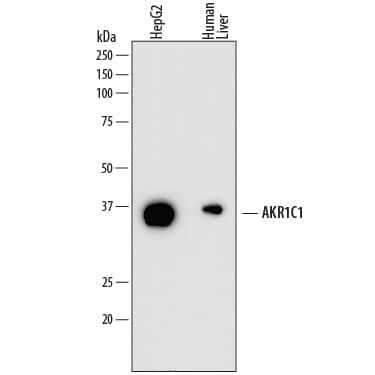Human Aldo-keto Reductase 1C1/AKR1C1 Antibody
R&D Systems, part of Bio-Techne | Catalog # MAB6529

Key Product Details
Species Reactivity
Human
Applications
Simple Western, Western Blot
Label
Unconjugated
Antibody Source
Monoclonal Mouse IgG1 Clone # 859026
Product Specifications
Immunogen
E. coli-derived recombinant human Aldo‑keto Reductase 1C1/AKR1C1
Met1-Tyr323
Accession # Q04828
Met1-Tyr323
Accession # Q04828
Specificity
Detects human Aldo‑keto Reductase 1C1/AKR1C1 in ELISAs and Western blots. In direct ELISAs, less than 5% cross-reactivity with
recombinant human (rh) Aldo-keto Reductase 1C3 and 1C4 is observed.
Clonality
Monoclonal
Host
Mouse
Isotype
IgG1
Scientific Data Images for Human Aldo-keto Reductase 1C1/AKR1C1 Antibody
Detection of Human Aldo‑keto Reductase 1C1/AKR1C1 by Western Blot.
Western blot shows lysates of HepG2 human hepatocellular carcinoma cell line and human liver tissue. PVDF membrane was probed with 0.1 µg/mL of Mouse Anti-Human Aldo-keto Reductase 1C1/AKR1C1 Monoclonal Antibody (Catalog # MAB6529) followed by HRP-conjugated Anti-Mouse IgG Secondary Antibody (Catalog # HAF007). A specific band was detected for Aldo-keto Reductase 1C1/AKR1C1 at approximately 37 kDa (as indicated). This experiment was conducted under reducing conditions and using Immunoblot Buffer Group 1.Detection of Human Aldo‑keto Reductase 1C1/AKR1C1 by Simple WesternTM.
Simple Western lane view shows lysates of HepG2 human hepatocellular carcinoma cell line and human liver tissue, loaded at 0.5 mg/mL. A specific band was detected for Aldo‑keto Reductase 1C1/AKR1C1 at approximately 41 kDa (as indicated) using 1 µg/mL of Mouse Anti-Human Aldo‑keto Reductase 1C1/AKR1C1 Monoclonal Antibody (Catalog # MAB6529) . This experiment was conducted under reducing conditions and using the 12-230 kDa separation system.Applications for Human Aldo-keto Reductase 1C1/AKR1C1 Antibody
Application
Recommended Usage
Simple Western
1 µg/mL
Sample: HepG2 human hepatocellular carcinoma cell line and human liver tissue
Sample: HepG2 human hepatocellular carcinoma cell line and human liver tissue
Western Blot
0.1 µg/mL
Sample: HepG2 human hepatocellular carcinoma cell line and human liver tissue
Sample: HepG2 human hepatocellular carcinoma cell line and human liver tissue
Formulation, Preparation, and Storage
Purification
Protein A or G purified from hybridoma culture supernatant
Reconstitution
Sterile PBS to a final concentration of 0.5 mg/mL. For liquid material, refer to CoA for concentration.
Formulation
Lyophilized from a 0.2 μm filtered solution in PBS with Trehalose. *Small pack size (SP) is supplied either lyophilized or as a 0.2 µm filtered solution in PBS.
Shipping
Lyophilized product is shipped at ambient temperature. Liquid small pack size (-SP) is shipped with polar packs. Upon receipt, store immediately at the temperature recommended below.
Stability & Storage
Use a manual defrost freezer and avoid repeated freeze-thaw cycles.
- 12 months from date of receipt, -20 to -70 °C as supplied.
- 1 month, 2 to 8 °C under sterile conditions after reconstitution.
- 6 months, -20 to -70 °C under sterile conditions after reconstitution.
Background: Aldo-keto Reductase 1C1/AKR1C1
References
- Jez, J.M. et al. (1997) Biochem J. 326:499.
- Penning, T.M. et al. (2000) Biochem. J. 351:67.
- Rizner, T.L. et al. (2003) Endocrinology. 144:2922.
- Steckelbroeck, S. et al. (2006) J. Pharmacol. Exp. Ther. 316:1300.
- Penning, T.M. et al. (2004) Mol. Cell. Endocrinol. 1784:1342.
- Penning, T.M. and M.C. Byrns (2009) Ann. N. Y. Acad. Sci. 1155:33.
- Baumann, D.R. et al. (2004) Drug News Perspect. 17:563.
Long Name
Aldo-keto Reductase Family 1, Member C1
Alternate Names
2-ALPHA-HSD, 20-ALPHA-HSD, AKR1C1, AldoketoReductase 1C1, DDH1, HAKRC, HBAB
Entrez Gene IDs
1645 (Human)
Gene Symbol
AKR1C1
UniProt
Additional Aldo-keto Reductase 1C1/AKR1C1 Products
Product Documents for Human Aldo-keto Reductase 1C1/AKR1C1 Antibody
Product Specific Notices for Human Aldo-keto Reductase 1C1/AKR1C1 Antibody
For research use only
